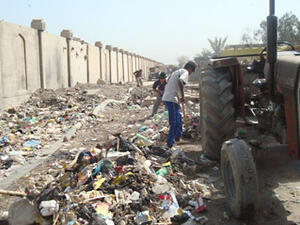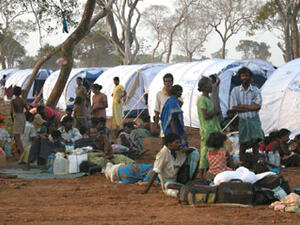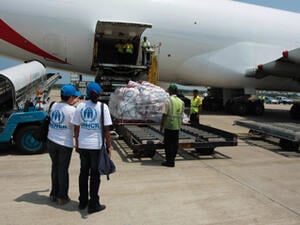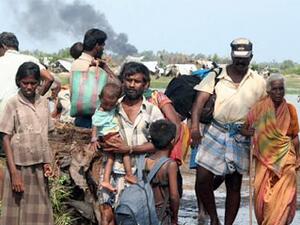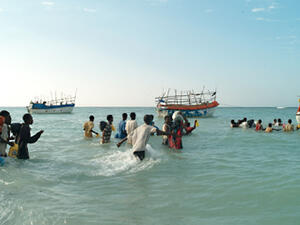Former Liberian refugee seeks to help others adjust to life in US
Former Liberian refugee seeks to help others adjust to life in US

Jacob Massaqoui meets African Refuge staff ahead of a medical clinic held weekly at the organization's office in Staten Island, New York.
NEW YORK, United States, March 11 (UNHCR) - In the cramped basement of a public housing apartment block in New York's Staten Island, 25 minutes by ferry from Manhattan's financial district, a small group of mostly volunteer staff are preparing to open the doors of health clinic in an area that recently saw the closure of two local hospitals.
The weekly clinic caters to a cross section of the blue-collar Park Hill neighbourhood; day labourers, newly arrived immigrants and former refugees, most of the latter from Liberia.
Directing the preparations, and always in motion, is Jacob Massaquoi, himself a former refugee from Liberia and now director of African Refuge, which seeks to ease the transition for those adjusting to new lives in the United States.
It was as a result of Massaquoi's work as a human rights activist and humanitarian that he was invited by the UN refugee agency to attend a commemoration for the Year of the Volunteer in 2001 at the agency's Geneva headquarters. But his outspokenness had also come to the attention of the former Liberian strongman, Charles Taylor.
Upon his return from Geneva, Massaquoi was arrested and taken to a cell where he says, without elaborating, "terrible things" were done to him. During a second attempted arrest some months later, he was able to escape, eventually finding refuge in Ghana before gaining asylum in the United States.
"I have seen a lot of violence and witnessed the execution of my brother," he said from his small office, which today doubles as the examination room. "But I am no better or more worthy of life than those who have died. I created African Refuge because I want to give voice to those who died. That is my purpose."
In addition to the weekly medical clinic, which is staffed by volunteer nursing students, African Refuge helps those who come to its drop-in centre to find housing, jobs or a school for their children. A youth centre gives young people a place to go after school while their parents work, many as home health aides and security guards. With high levels of illiteracy among those who come to the centre, assistance can also come in the form of help deciphering a utility bill.
African Refuge employs just three staff, two of them part-time, but its work is attracting attention beyond the shores of Staten Island. Massaquoi was recently profiled by a national news programme for a segment called "Making a Difference."
The organization relies on voluntary contributions. In 2007, those amounted to US$10,000. "I paid myself a salary of US$16 a month," said Massaquoi. Today, its budget has increased more than tenfold, but with the US economy in freefall and unemployment over eight percent, Massaquoi is aware that challenges remain.
"Tough times demand innovative solutions," he said. "There will always be people and foundations looking to support effective organizations. We provide more than US$5 million in services on a budget of around US$120,000."
So confident is Massaquoi, that his ambitions now stretch beyond African Refuge to include the people he left behind in Liberia eight years ago. "My ultimate goal is to be able to provide the sort of services we do here in Staten Island to the people of my village," he said. "I'd like to be able to give some of them the sort of opportunities I've had."
By Tim Irwin in New York, United States



